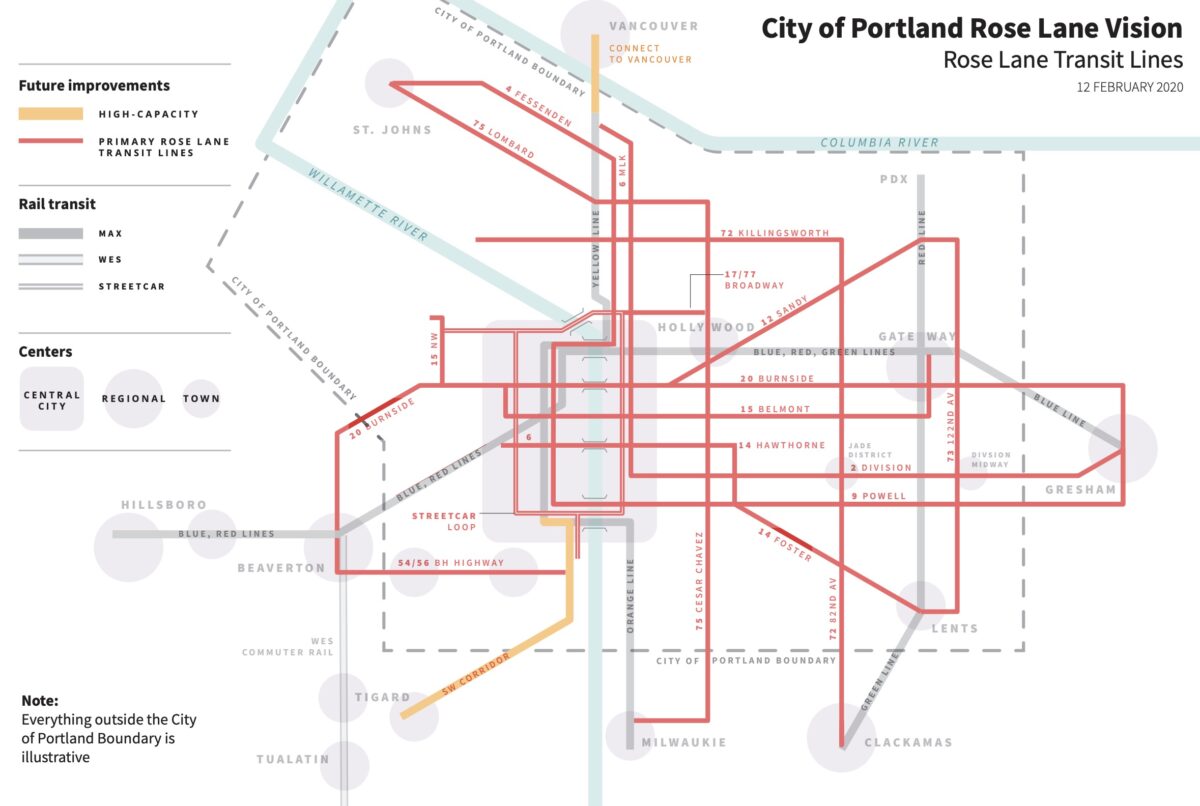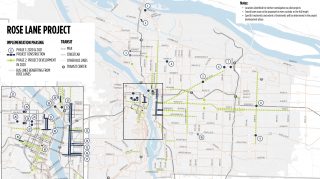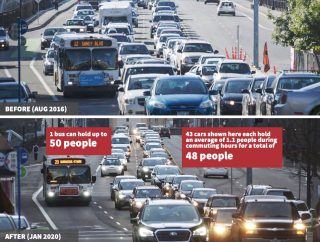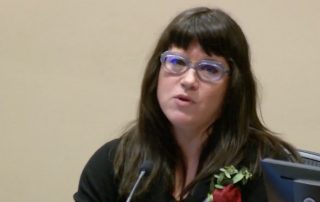
With existing plans as a foundation, buoyed by success of three initial projects, and — most importantly — with the full support of City Commissioner Chloe Eudaly and her staff, Portland City Council voted unanimously on Thursday to endorse the Rose Lane Project.
“We are now trying to correct that over-dedication of resources and space and priority to drivers. And I know it’s painful and unpopular with some people, but it has to happen.”
— Chloe Eudaly, city commissioner
Introducing her ordinance at the outset of the council meeting yesterday, Commissioner Eudaly summed up why she’s pushed so hard and so fast for this project: “Climate change is here, we are already experiencing its consequences, and it hits our most vulnerable community members hardest.”
To reach our adopted emissions and transportation goals, Eudaly said Portlanders must “dramatically reduce” reliance on internal combustion engines, make 250,000 fewer trips by car every day, and drive half as much as we do today.
With the vote, council has given the green light to a vision of corridors citywide where transit vehicles will have priority over other road users. In addition to adopting the Rose Lane Project vision, councilors have also dedicated $7 million in funding to immediately begin final design and construction of 29 projects and a second phase that could cost up to $10 million. Since most phase one projects were already in development or “lend themselves to quick build” (in the words of a PBOT project manager), they will be constructed this year.
In close partnership with TriMet, PBOT will deploy tools already endorsed by council via the Enhanced Transit Corridors plan passed in 2018. Using a mix of signal technology, dedicated lanes, and other methods, PBOT will aim to make Rose Lane lines more “fast, frequent, and full”. They promised council the projects would make 24% more jobs accessible within 45 minutes on transit to 25,000 more people.
Advertisement

TriMet Executive Director of Public Affairs Bernie Bottomly said yesterday was a “seminal moment for the city” and likened it to PBOT and TriMet’s partnership on pioneering efforts like the downtown Transit Mall, light rail network and streetcar lines.
While TriMet is our regional transit provider, PBOT owns and manages city streets, so the two agencies have to dance together on big initiatives like this. Since TriMet has an unelected board of directors, a powerful employee union, and they aren’t a public agency, PBOT is forced to negotiate with them for help. They’ve agreed to add some service on Rose Lane lines (the effort dovetails with the boost in funding TriMet receives as part of the 2017 transportation package passed by the Oregon Legislature), but Eudaly acknowledged yesterday she was hoping for more.
Speaking to Bottomly, Eudaly said, “I do have to admit that I had hoped for a greater commitment to increase service to run simultaneously with the Rose Lanes. My concern is if we don’t meaningfully increase capacity on these lines that we won’t maximize their potential. We will have diminished outcomes in the pilot that may dampen the public’s enthusiasm and not get us to our ridership goals as soon as possible.”
Eudaly then asked Bottomly to be more nimble in making changes if/when Rose Lane projects significantly change ridership levels and she requested that TriMet invests any operational savings back into increased service on Rose Lane lines (she said TriMet currently spends $14 million a year due to congestion – UPDATE: Eudaly was referencing a June 2019 Willamette Week article that said TriMet spent $14 million over two years compensating for slow-moving traffic).
“If we can do more, we will,” Bottomly replied.
Advertisement

But that wasn’t the end of tough questions directed at the TriMet boss. Nervous laughter erupted in council chambers when Commissioner Amanda Fritz asked unexpectedly, “Would you state on the record that if we could find funding to make the entire system fare-free, would you be willing to do that?” After joking that he was out of time and had to go, Bottomly squeezed out a “Yes, but” and then explained that the $100 million annual farebox revenue isn’t the sum total of what it would cost and that a large increase in riders would lead to many other expenses for the agency.
“If it covers the real cost of the system, then yes,” Bottomly said. The exchange ended with Fritz saying, “Our planet is on fire, we need to take some bold moves.”
“Thank you. I’ve been grinning all day. I can’t believe this has happened so quickly. It’s incredible. This is going to be transformative. Please give it everything.”
— Alan Kessler, Portland resident during public testimony
30 people signed up to testify on the plans. The vast majority were strongly in favor. One man in opposition, Terry Parker, said, “Any plan that would reduce motor vehicle capacity must be accompanied by an environmental impact statement.” Another man who opposed it said councilors should work to make Portland more “car-friendly” or residents will move to other cities where driving is easier.
Attorney and activist Alan Kessler (yes that Alan Kessler) was ecstatic about the plans. But he implored council to get tougher on TriMet and do even more. “We need to tell TriMet, it’s not OK that you’re spending a billion dollars on a choo-choo train [SW Corridor light rail] that’s going to be here in a decade… What kind of transformation could we get with that kind of money?”
When it came time for closing remarks from commissioners, Eudaly took time to emphasize that transit-dependent Portlanders who don’t make much money and who are forced to live in parts of our city without a lot of transportation options are “at the heart” of this effort. She also took a wider view on what she pushed through today: “This city was not made for cyclists, pedestrians or bus riders. Unfortunately, it was made for auto drivers and we are now trying to correct that over-dedication of resources and space and priority to drivers. And I know it’s painful and unpopular with some people, but it has to happen.”
For many people, yesterday was a high point of Portland transportation history. “Thank you. I’ve been grinning all day,” testified Alan Kessler. “I can’t believe this has happened so quickly. It’s incredible. This is going to be transformative. Please give it everything.”
Learn more and stay plugged into Rose Lanes and the related Central City in Motion plans via this bulletin just released by PBOT.
— Jonathan Maus: (503) 706-8804, @jonathan_maus on Twitter and jonathan@bikeportland.org
— Get our headlines delivered to your inbox.
— Support this independent community media outlet with a one-time contribution or monthly subscription.



